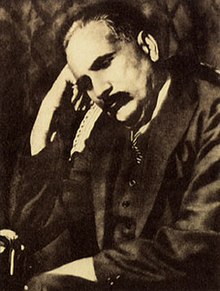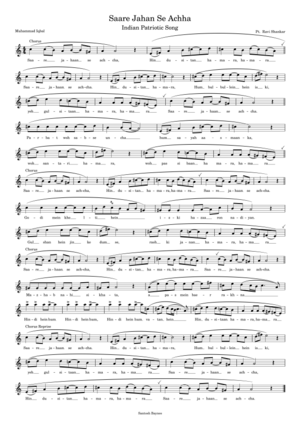| Sare Jahan se Accha | |
|---|---|
| by Muhammad Iqbal | |
| Original title | Taranah-e-Hindi |
| First published in | Ittehad |
| Country | British India |
| Language | Urdu |
| Form | Ghazal |
| Publication date | 16 August 1904 |


"Sare Jahan se Accha" (Urdu: سارے جہاں سے اچھا; Sāre Jahāṉ se Acchā), formally known as "Tarānah-e-Hindi" (Urdu: ترانۂ ہندی, "Anthem of the People of Hindustan"), is an Urdu language patriotic song for children written by poet Allama Muhammad Iqbal in the ghazal style of Urdu poetry.[a] The poem was published in the weekly journal Ittehad on 16 August 1904.[1] Publicly recited by Iqbal the following year at Government College, Lahore, British India (now in Pakistan) it quickly became an anthem of opposition to the British Raj. The song, an ode to Hindustan—the land comprising present-day Bangladesh, India and Pakistan, was later published in 1924 in the Urdu book Bang-i-Dara.[2]
By 1910, Iqbal's worldview had changed to become global and Islamic. In a new song for children, "Tarana-e-Milli," written in the same metre, he changed the homeland from "Hindustan" to the "whole world." In 1930, in his presidential address to the Muslim League annual conference in Allahabad, he supported a separate nation-state in the Muslim-majority areas of the subcontinent, an idea that inspired the creation of Pakistan.
Saare Jahan se Accha has remained very popular, but only in India.[b] An abridged version is sung and played frequently as a patriotic song and as a marching song of the Indian Armed Forces.[3] The most popular musical composition is that of sitar maestro Ravi Shankar.
- ^ a b c Pritchett, Frances. 2000. "Tarana-e-Hindi and Taranah-e-Milli: A Study in Contrasts." Columbia University Department of South Asian Studies.
- ^ "Saare Jahan Se Accha: Facts about the song and its creator". India Today. 21 April 2016. Archived from the original on 23 January 2017. Retrieved 17 October 2016.
- ^ Imam, Sharjeel (6 July 2016). "Sare Jahan Se Acha: The Idea of India in Early 20th Century Urdu Poetry". The Wire. Retrieved 17 October 2016.
Cite error: There are <ref group=lower-alpha> tags or {{efn}} templates on this page, but the references will not show without a {{reflist|group=lower-alpha}} template or {{notelist}} template (see the help page).